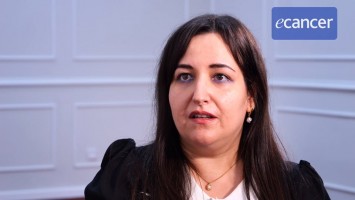I’m a PI of a trial that is being funded by IARC, and let me thank IARC for giving us this chance. This trial is specifically drawn just in order to evaluate, to confirm, the prevalence of the aromatase gene amplification. In the paper published in Nature Genetics we found out that amplification and also gene mutation may occur during roughly 15%-20% of the patients, and so we designed this trial just in order to have the primary tumour and also the tumour relapse, the metastatic deposits, that may occur after one, two, five, ten years after the primary diagnosis.
We will evaluate not only aromatase amplification and also, of course, ER mutation but also we will apply a targeted, next gen sequencing panel including most of the genes which are frequently mutated in ER positive breast cancer just in order to evaluate the genomic mechanism of resistance for our patients. The series has been diagnosed and treated at the European Institute of Oncology of Milan, but of course the grant is a multicentric study involving the University of Genova, the Imperial College in London, the IFOM and, of course, our lab in EIO.
We think that we will be able to evaluate, to better define, the prevalence and also to evaluate the prognostic significance of this alteration because, of course, the series is a very well-annotated series and so we have data on the survival of these patients after the relapse. So, we will see whether the occurrence of some kind of genomic profile will be associated with the specific prognostic impact on our patients. And also we will collect also, of course, predictive data. We know that these patients have been treated by specific endocrine treatments, and we will be establishing which kind of treatment is most effective based on the specific genomic profile.
Have these patients only had endocrine therapy?
They may have had chemotherapy, but most of the patients had received an exclusive endocrine therapy treatment. That is quite a specific type of treatment we give to our patients at the European Institute of Oncology from the very beginning thanks to Aaron Goldish and his group. They were pioneering this kind of treatment. So most of the patients have been treated just by endocrine treatment, but of course chemotherapy is allowed. This is quite a technicality, but we could use the chemotherapy setting just in order to stratify the results, to see whether chemotherapy is impacting according to a specific genomic signature.








